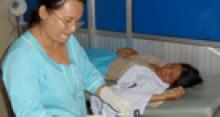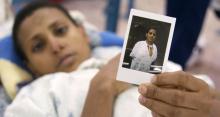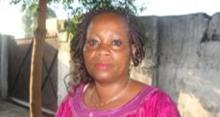Hero: Dr. Rahel Nardos
Heroes
Exclusive one-on-one interviews with extraordinary individuals working on behalf of women, children, and families worldwide.

HER DREAM
"Women in Ethiopia are not well represented and they are not good advocates for their health because of their status in society. More needs to be done to assure the education of girls, so that they are empowered and know what is best for them so they can be their own advocates."
WHY SHE’S A HERO
Dr. Rahel Nardos started a global women’s health program between a rural hospital in her native Ethiopia, and Oregon Health and Science University (OHSU) in the US. Rahel’s team is improving maternal health in Ethiopia one woman at a time, by training Ethiopian doctors and midwives in life-saving obstetric procedures and preventative maternal health.
A CHAT WITH HERO RAHEL NARDOS
RAHEL: Ethiopia has one of the highest maternal mortality rates in the world, at number six. I was very interested to find out how I could use my life and work here in the US to serve as a bridge to help my people in Ethiopia. I always have felt like there’s a reason why I’m here, why I’ve had the opportunity to go through college, medical school, a residency and a fellowship in the US. It’s a very long journey and I feel I’m in a unique position to contribute because of my knowledge of both cultures.
IMOW: You have worked a lot with obstetric fistula—what is fistula and why is it a problem?
RAHEL: Obstetric fistula is a condition that is very grave problem in much of the developing world, but largely preventable. Fistula happens during childbirth as a result of prolonged obstructive labor; when a women is in labor for several hours or days and the baby’s head is trapped in the birth canal, and is not able to be delivered either because the baby is too big, the pelvis is too small, or the baby is presenting in a way that is not amenable to vaginal delivery. In the US, we have the doctors and we have the hospitals that recognize when it’s happening and they can take you in and deliver the baby safely before the baby is trapped for days. But in the developing countries like Ethiopia, more than 95% of women labor at home, sometimes because that’s what they are used to doing, sometimes due to inaccessibility of hospitals, or sometimes hospital staff are simply not trained to perform assisted labor or c-sections.
So, fistula results from a long bout with obstructed labor, sometimes for days—and the entrapment of the head between the vagina and the bladder or rectum. The tissue loses blood supply and dies, leaving a hole from which urine or stool leaks out uncontrollably.
IMOW: If a fistula is left unattended, what happens to the mother and baby?
RAHEL: It’s terrible; In the developing world, in Ethiopia, a woman’s status is based on her role as a wife and as a mother, and when you have this injury usually you are leaking urine constantly or sitting still constantly. You don’t have showers, you don’t have bathtubs. It’s hard to keep clean, and these women are embarrassed, depressed, and on top of that stigmatized for something they can’t control. They don’t mix with society because of their odor. Their husbands most likely leave them. Their babies die. Over 95% of them have lost their pregnancies because babies don’t survive this kind of ordeal. So you are looking at a woman who is not only physically injured, but also socially and psychologically injured. It is terrible.
IMOW: Where did you start on your mission to help with this problem?
RAHEL: While I was finishing up my residency, I met with the people at the Hamlin Fistula Hospital in Ethiopia, because I was very interested in female pelvic floor medicine and surgery. I took a year off to work with Hamlin and the staff. I think that was a turning point for me. Ethiopia has over 80 languages and cultures, and women came from everywhere to get care at this hospital for obstetric fistula. It was eye-opening, because aside from taking care of them medically and doing surgeries, I got the chance to talk to these women who came from all over the country. I was able to ask, what led to this?How was it that they got married so young and had children so young? Why did they labor for three or four days, and why didn’t they go to the doctor? Those kinds of things were very eye-opening to hear, and very educational for me because I realized what I need to focus on is not just birth-related problems like fistula, but also preventative health. How can we stop this from happening?
IMOW: And you’re already well on your way! Tell me about what you’re doing now at Oregon Health and Science University (OHSU).
RAHEL: Since my work at Hamlin, I started a program at OHSU. We created a global woman’s health program by establishing a relationship with a rural hospital in Ethiopia called the Gimbie Adventist Hospital. We started by asking them what they needed, and they asked us to focus on three things. The first is pelvic prolapse, which is when the uterus falls out of the woman’s womb because of damage to the nerves and muscles of the pelvic floor. This is a big problem in Ethiopia because some women deliver many, many babies and some with obstructed labor. So our team goes there once a year to train the local doctors and do surgeries on these women. The second thing they wanted was help with midwifery education. We are collaborating with their newly established midwifery program to find ways to strengthen their training program.The third thing they asked us to focus on was family planning. Now we are in the process of trying to establish a family planning program for the community so that women are not putting themselves at high risk for early, late or multiple pregnancies.
Top photo copyright Sarah Henderson, sirenapictures.com. Additional photos courtesy of Rahel Nardos.
Take Action
Help Rahel realize her dream for Ethiopian mothers
Visit the Oregon Health and Science University Center for Women’s Health to find out more about their collaboration with Gimbie Adventist Hospital to train Ethiopian rural health providers in providing safe pregnancy and delivery.
Related Content
|
Prum Than empowers women to make safe reproductive health choices in her work at a reproductive and maternal health care clinic in Cambodia. |
Christy Turlington Burns explains that in order to make true progress on maternal health, we need to collectively prioritize mothers and advocate on their behalf. |
Sarah Henderson tells the story of an Ethiopian woman who suffered from fistula and who received care at Hamlin Fistula Hospital. |
Yvette Mulongo works with women in the Democratic Republic of Congo on issues of family planning and gender based violence, saving women's lives in the process. |





